If you’re planning a camping trip or find yourself in a situation where you need to sleep on the ground, the last thing you want is a surprise encounter with a snake.
The thought alone can give anyone shivers down their spine. But fear not, because this article has got you covered.
In the following paragraphs, you’ll discover practical tips and techniques that will help keep those slithery creatures far away from your peaceful slumber.
So grab a seat, or better yet, a sleeping bag, and get ready to learn how to keep snakes at bay when sleeping on the ground.
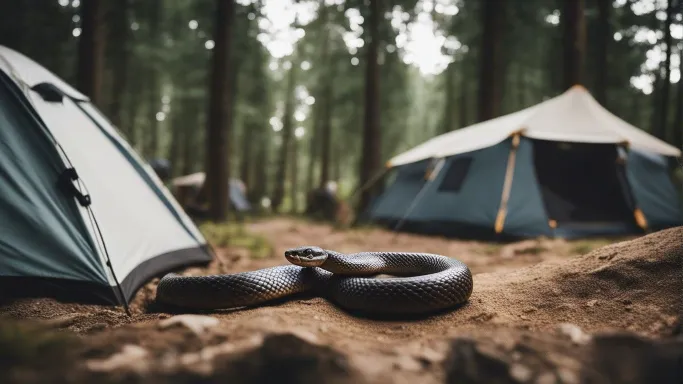
Choosing the Right Sleeping Spot
When you’re sleeping on the ground, it’s important to choose a spot that minimizes your risk of encountering snakes. One of the first things to consider is the snake activity in the area. Avoid spots known for high snake activity such as areas near water sources or dense vegetation. Look for flat and open areas where snakes are less likely to hide.
Additionally, it’s important to clear the area of any debris or foliage that may attract or provide hiding spots for snakes. Remove any fallen branches, rocks, or leaves that could potentially be a snake’s hiding place. By creating a clean and open sleeping space, you decrease the chances of a snake slithering into your area.
Setting up a Snake-Proof Perimeter
To further protect yourself from snakes while sleeping on the ground, it’s essential to create a snake-proof perimeter around your sleeping area. One of the first things you should do is clear any tall grass or vegetation near the sleeping area, as tall grass can attract snakes and provide them with hiding spots.
Another effective way to create a barrier against snakes is by using one of the many snake repellents on the market such as repellent balls that use natural essentials oils that deter snakes. These balls can be placed around your campsite to deter any unwanted slithering visitors.
Another great way to deter snakes is by using an ultrasonic solar powered repellent. These devices use sonic frequencies to penetrate the ground and scare away snakes. Just put these in the ground around your sleeping spot, you can create an additional deterrent for snakes.
For added protection, consider using snake-proof fencing or barriers. These can be set up around your sleeping area to prevent snakes from entering. Snake-proof fencing is made with materials that snakes cannot slither or climb through, keeping them at a safe distance from you while you sleep.
Lighting up the Surrounding Area
Keeping the surrounding area well-lit can be an effective way to deter snakes from approaching your sleeping spot. Darkness provides cover for snakes, making it easier for them to go unnoticed. By lighting up the area, you decrease the chances of a snake sneaking up on you while you’re vulnerable asleep.
Installing motion sensor lights around your sleeping area is a practical option. These lights will automatically turn on when they detect motion, alerting you to any potential snake activity. Additionally, using solar-powered lights can be a convenient and eco-friendly choice, as they charge during the day and illuminate the area at night.
In addition to the installed lights, it’s always a good idea to have a flashlight nearby. This will allow you to quickly check your surroundings before settling down for the night. A flashlight will also come in handy if you need to navigate around your sleeping area during the night.
Keeping a Clean Campsite
Maintaining a clean campsite is essential not only for your overall comfort but also for deterring snakes. Snakes are attracted to food sources, so it’s essential to properly dispose of food waste. Avoid leaving any food scraps or garbage around your sleeping area, as they could attract snakes searching for an easy meal.
Seal and secure food containers to prevent any smells from spreading and attracting snakes. It’s also important to clean up spills and crumbs immediately. Any leftover food residue can attract not only snakes but also other unwanted pests, which can in turn attract snakes. By keeping your campsite clean and free of food, you significantly decrease the chances of snakes approaching your sleeping area.
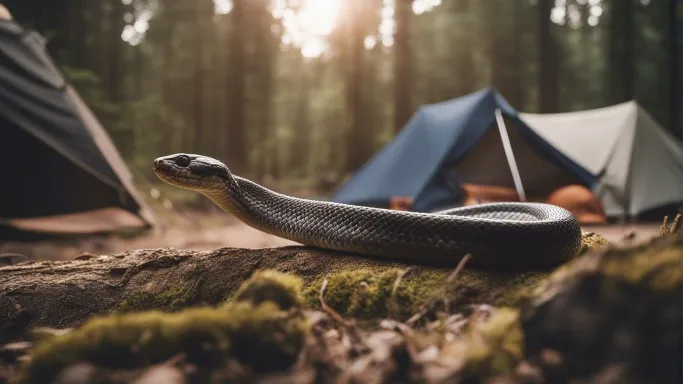
Avoiding Scent Attractants
Snakes have a keen sense of smell, and certain scents can attract them to your sleeping area. To avoid attracting snakes, it’s crucial to store toiletries and scented items securely. Ensure that these items are sealed in airtight containers or bags to prevent their scent from spreading and attracting snakes.
Avoid using perfumes or scented lotions before sleeping. While these scents may be pleasant to humans, they can be enticing to snakes. By refraining from using scented products, you minimize the risk of attracting snakes to your sleeping area.
Furthermore, it’s important to keep garbage sealed and away from your sleeping area. The smell of decaying food can lure snakes, so make sure to properly seal garbage bags and store them in designated containers away from where you’re sleeping.
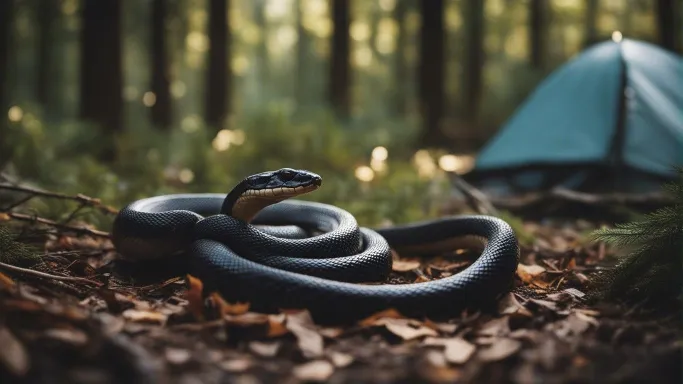
Using Natural Snake Deterrents
There are several natural snake deterrents that you can use to enhance your protection while sleeping on the ground. One commonly used method is spreading mothballs around your sleeping area. The strong odor of mothballs is known to repel snakes, making them less likely to approach your chosen spot.
Another natural option is to use essential oils with strong scents that snakes dislike. Cedarwood and cinnamon essential oils, for example, have been found to deter snakes. By diluting these oils and spraying them around your sleeping area, you create a barrier that snakes are less likely to cross.
Dispersing sulfur powder is another natural deterrent against snakes. Snakes have a strong aversion to sulfur, so spreading it around your sleeping area can help keep them at bay. Be sure to follow the instructions on the product label for safe and effective use.
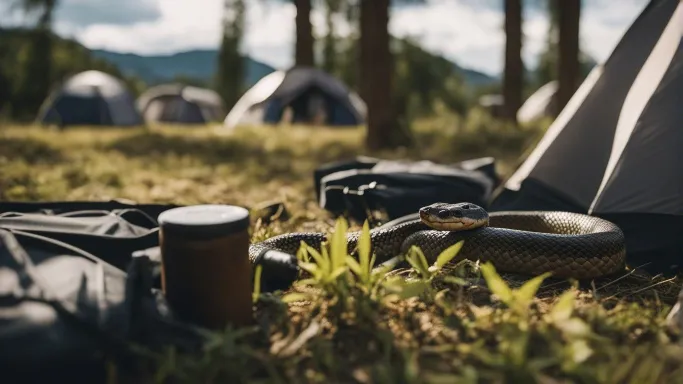
Sleeping in Snake-Proof Gear
Investing in snake-resistant clothing is a wise choice when sleeping on the ground in snake-prone areas. Snake-resistant clothing is specifically designed to reduce the risk of snake bites. These garments are typically made with tightly-woven fabric or specialized materials that offer protection against snake fangs.
In addition to snake-resistant clothing, you can also consider using a snake-proof sleeping bag or hammock. These gear options provide an additional layer of protection by incorporating materials that snakes cannot easily penetrate. Before each use, it’s important to inspect your gear for any damage that may compromise its effectiveness.
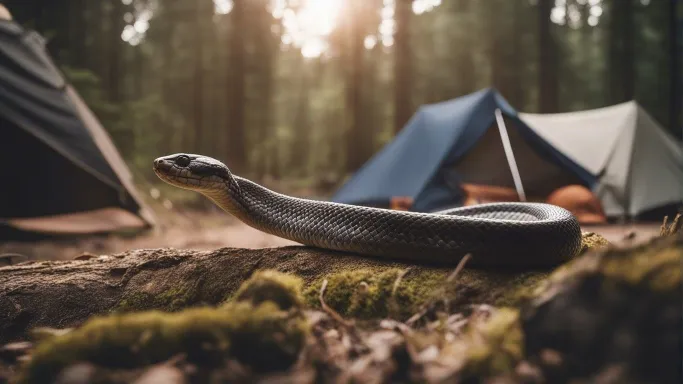
Being Mindful of Snake Behavior
Understanding snake behavior and habitats can help you make informed decisions about where to sleep and how to stay safe. Learn about the local snake species in the area you plan to sleep in and familiarize yourself with their habits. This knowledge will help you identify potential snake hiding spots and take precautions accordingly.
When moving rocks or logs in the sleeping area, always exercise caution. These objects can serve as hiding spots for snakes, and disturbing them without proper care can lead to unexpected encounters. Take the time to carefully inspect your surroundings and use tools like a stick or pole to move potential snake hiding spots safely.
Lastly, avoid sleeping near areas that snakes are known to frequent, such as tall grass, dense bushes, or rocky crevices. By choosing a sleeping spot away from snake hiding spots, you reduce the likelihood of encountering one while you’re sleeping vulnerable on the ground.
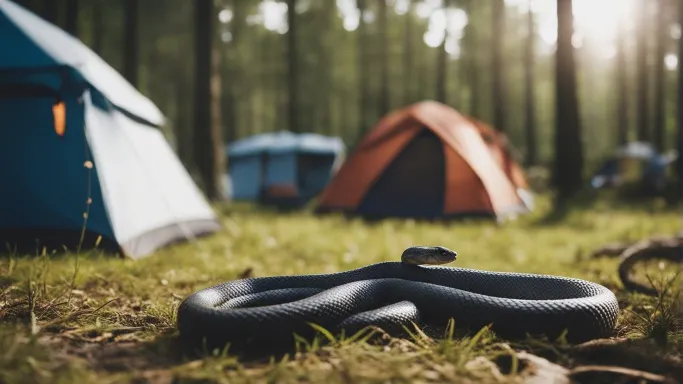
Knowing First Aid for Snake Bites
While taking preventive measures is crucial, it’s also important to be prepared and knowledgeable about first aid for snake bites. Familiarize yourself with the symptoms of a snake bite, including swelling, pain, and discoloration around the bite area. If you or someone you’re camping with is bitten by a snake, being able to recognize these symptoms can prompt immediate action.
Learn proper first aid techniques for snake bites, including how to immobilize the bitten limb, keep the victim calm, and seek medical assistance promptly. It’s also important to have a snake bite kit on hand, which typically includes items such as a suction device, bandages, and antiseptic wipes. Familiarize yourself with the contents of the kit and how to use them correctly.
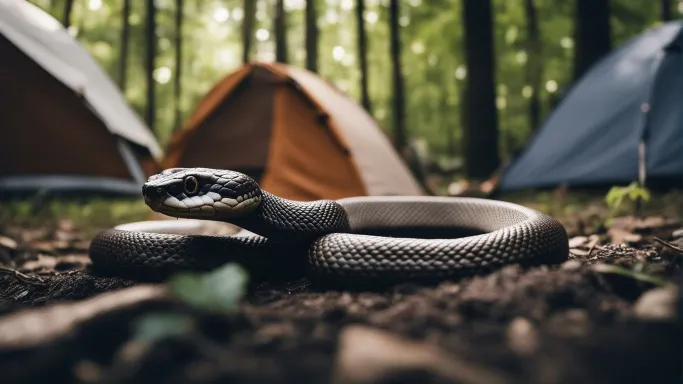
Choosing Alternative Sleeping Options
If sleeping on the ground in snake-prone areas still makes you uncomfortable, there are alternative options to consider. Using a tent or camping hammock with an elevated sleeping platform can provide an added layer of security. Elevating your sleeping area makes it harder for snakes to reach you while you sleep, reducing the chances of an encounter.
Utilizing designated camping areas with snake mitigation measures is another alternative. Some camping grounds have implemented snake-proof measures such as snake-proof fencing or regular inspections to minimize the presence of snakes. Research and choose camping areas that prioritize snake safety to further ensure a worry-free sleeping experience.
For those who prefer maximum protection, sleeping in a vehicle or camper can offer added security. These enclosed spaces provide an effective barrier against snakes. However, it’s important to note that proper ventilation and safety precautions should still be taken when sleeping in enclosed spaces.
By following these tips, you can minimize the risk of encountering snakes while sleeping on the ground. Remember, prevention is key, so take the necessary precautions to ensure a safe and peaceful night’s sleep in snake-prone environments.
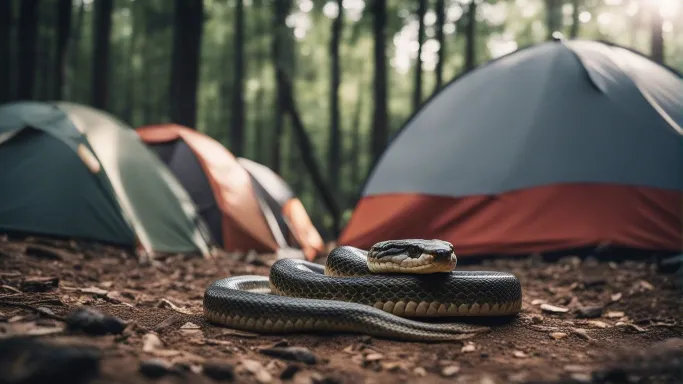
Final Thoughts
In conclusion, embarking on an adventure in the great outdoors need not be marred by the fear of encountering snakes during your slumber.
By implementing proactive measures, such as selecting an optimal sleeping spot, establishing a snake-proof perimeter, and utilizing light to your advantage, you can substantially lessen the risk of unwelcome encounters.
Equipping yourself with knowledge on local snake behaviors and first aid procedures further fortifies your defense, promoting both safety and peace of mind.
Alternative sleeping arrangements, including elevated platforms or utilizing snake-proof gear, present viable options for those seeking additional security.
Remember, a clean and well-maintained campsite not only keeps snakes at bay but also enhances your overall camping experience.
As you venture into snake-prone territories, let preparedness be your guiding principle, ensuring a serene and enjoyable connection with nature, free of slithery surprises.



